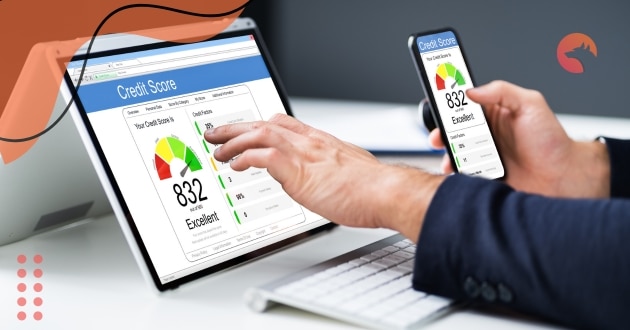How to check credit score is a question that many individuals have, but it often goes unanswered due to a lack of understanding about the importance of credit scores and the steps needed to monitor them.
It affects your ability to get loans, mortgages, and even impacts your insurance premiums and job opportunities.
It is a number that summarizes your financial reliability based on your borrowing history, and it is used by banks, credit card companies, landlords, and even some employers to assess your financial habits.
Checking your credit score regularly is crucial to maintaining good financial health. Many people only realize how important their credit score is when they are applying for a loan or credit card and are faced with higher-than-expected interest rates or outright rejection.
However, by regularly monitoring your credit score, you can ensure that you are aware of any changes in your credit standing and address potential issues early.
Knowing how to check credit score gives you control over your financial situation. It allows you to stay proactive in protecting your credit health and ensures you are aware of any discrepancies that might affect your creditworthiness.
What is a Credit Score?
A credit score is a three-digit number that represents your financial reliability and how well you manage debt. The higher your credit score, the more favorable loan terms and interest rates you’re likely to receive. Conversely, a lower score may result in higher interest rates or even denial of credit.
The most significant factor affecting your credit score is your payment history, which accounts for about 35% of the score. Keeping credit utilization below 30% and maintaining a mix of different credit types can also positively impact your score.
Additionally, the length of your credit history and the number of recent credit inquiries play a role in determining your overall score. Regularly reviewing your credit report for errors is crucial to ensure accuracy.
When applying for a mortgage, most lenders prefer a credit score of at least 620, although higher scores (740 and above) increase your chances of securing favorable loan terms.
A strong credit score is important not only for obtaining loans but also for getting better interest rates, reducing borrowing costs, and improving your financial opportunities. Monitoring and understanding your credit score regularly is key to maintaining a healthy financial profile.
In addition, it’s important to understand the Credit Score Needed for Mortgage applications. While different lenders may have slightly varying requirements, most mortgage lenders look for a credit score of at least 620.
Why Checking Your Credit Score is Important
Checking your credit score is essential for maintaining good financial health. By doing so, you gain valuable insights into your creditworthiness and financial habits. Regularly monitoring your credit score helps you identify any changes or errors in your credit report, which could otherwise go unnoticed and negatively affect your financial standing.
For instance, errors such as incorrect reporting of late payments or fraudulent accounts can lower your score, making it harder to secure loans or credit at favorable rates. Therefore, it’s crucial to be proactive in checking your credit score to catch such issues early.
Furthermore, knowing your credit score enables you to assess your financial health and make informed decisions. If you’re planning a major financial milestone, such as purchasing a home or a car, your credit score can significantly impact the terms of the loan or mortgage you’re offered.
A higher score generally leads to lower interest rates, saving you money over time. Additionally, even if you’re not planning a big purchase, keeping track of your score helps you stay in control of your finances. For example, if your score is lower than expected, you can take steps to improve it, such as paying down high credit card balances or disputing inaccuracies in your report.
How to Check Your Credit Score
Checking your credit score is easier than ever, with several accessible methods available to consumers. One of the simplest ways to begin is by requesting a free credit report. In many countries, including the United States, you are entitled to a free credit report once a year from each of the three major credit bureaus, Experian, Equifax, and TransUnion.
In addition to obtaining free reports, many banks and credit card companies now offer free access to your credit score. This can be done through their online banking platforms or mobile apps.
While the score provided may differ slightly from the one used by lenders, it still serves as a good indicator of where you stand financially. For instance, many credit card providers offer monthly updates of your score, allowing you to track changes over time.
This feature is incredibly useful for those who want to monitor their credit and make adjustments as needed to improve it. Moreover, there are several credit monitoring services available that give you access to your credit score, often for free or for a low monthly fee.
Services like Credit Karma and Experian provide not only your score but also tools and resources to help you understand the factors affecting it. These platforms can alert you to any changes in your credit report, which could be helpful in detecting fraud or identity theft.

What to Do with Your Credit Score
Once you know how to check your credit score, the next step is understanding what to do with the information. Your credit score is not just a number; it’s a reflection of your financial health and can have a significant impact on your life. Here’s what to do once you’ve obtained your score:
1 – Review Your Credit Report for Errors
If you notice any errors, such as accounts you don’t recognize or incorrect payment information, dispute them with the credit bureau. Correcting errors can potentially improve your score and ensure your credit report is accurate.
2 – Improve Your Credit Score
If your score is lower than you’d like, there are steps you can take to improve it. Some of the most effective strategies include:
- Paying bills on time: This is one of the most important factors in determining your score.
- Reducing your credit card balances: High credit utilization negatively impacts your score.
- Avoiding unnecessary credit inquiries: Each time you apply for credit, it can lower your score.
- Building a longer credit history: Keep older accounts open to improve your credit history length.
Conclusion
In conclusion, understanding how to check credit score is an essential aspect of managing your financial well-being. Your credit score is not just a number. It’s a reflection of your financial habits and can significantly influence your access to credit, the interest rates you are offered, and even your employment opportunities.
By regularly checking your credit score, you not only stay informed about your current financial status but also take a proactive step toward ensuring financial security and avoiding unpleasant surprises.
Early detection of discrepancies or fraud can help you address issues before they escalate, safeguarding your financial future. Furthermore, knowing how to check credit score empowers you to make informed decisions about your finances.
Whether you are planning a major purchase, such as a home or car, or simply aiming to improve your financial health, regularly monitoring your score enables you to take the necessary actions to improve it.
Paying attention to your score can also help you understand what financial behaviors need adjustment, such as reducing credit card balances or paying bills on time. Over time, these changes can lead to a better score and more favorable financial opportunities.



